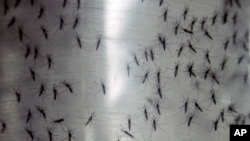Zika, like dengue fever and West Nile virus, is in a family of mosquito-borne viruses called flaviviruses. A new study suggests that Zika can be much worse for people previously infected with another flavivirus. In pregnant women, it may put their babies at higher risk for serious birth defects, including microcephaly, a condition in which infants are born with abnormally small heads.
The study highlights the potentially deadly effects of a phenomenon called antibody dependent enhancement, or ADE.
In the study of mice, researchers at the Icahn School of Medicine at Mount Sinai in New York gave the rodents human antibodies to dengue virus from 141 infected individuals. Another group of animals received antibodies from 146 individuals with West Nile virus. The mice were then exposed to Zika virus.
Only 21 percent of mice with the antibodies from dengue patients survived being infected with Zika. Similar results were reported in mice that received antibodies from West Nile patients.
Those results were compared to mice that received human antibodies that were not in the family of flaviviruses that includes Zika, dengue and West Nile. All of those animals lived. Another group of mice with no human antibodies also were able to fight off the illness when they were infected with Zika.
Virologist Jean Lim, a co-author of the study published in the magazine Science, said "Our studies may help to explain the severe Zika manifestations that we observed in the recent Zika-infected areas such as South America, where dengue virus is endemic."
The study also found that injecting the mice with high doses of dengue survivor antibodies made Zika less severe. It was the mice that were given smaller doses of antibodies that became sicker and died of the mosquito-borne illness.
Lim said she thinks that is because more potent flavivirus antibodies are protective against Zika. She believes weaker flavivirus antibodies interact with Zika, helping to infect vulnerable cells.
Fewer antibodies seem to act in the same way that an original mild case of dengue can make a second infection much worse.
Zika virus is not confined to the Americas. It originated in Africa, but has spread to India and parts of Asia.
More than one-third of the world's population lives in areas where dengue in endemic. As Zika virus spreads, so does the fear of more serious infections.
Lim told VOA it is possible that ADE — antibody dependent enhancement — could be happening in humans.
"I think in a subset of humans, yes, " she said. "Does it explain all the cases of microcephaly? I really can't answer that."
Lim is looking to explore the possible connection between ADE and severe birth defects.
There are already vaccines against dengue, and Lim says one possibility to prevent Zika's serious complications would be to develop a dengue vaccine that also protects against Zika.
Vaccines against Zika virus are now in clinical trials.




